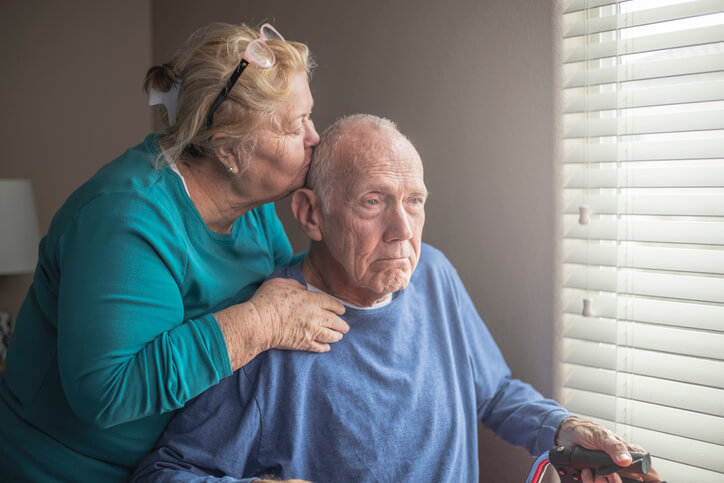
Family Caregivers Can Suffer from Depression, Anxiety
Occupational therapists & other providers can help caregivers of terminally ill patients
“Treat the whole patient” has become one of today’s healthcare mantras, but when terminal illness or debilitating conditions are involved, a new approach may be required: “Treat the whole family.”
 Occupational therapists who work with dementia patients, for instance, may not realize how much their patient’s caregiver is suffering. The stress and worry that many family members feel can take its toll. Some even develop severe conditions.
Occupational therapists who work with dementia patients, for instance, may not realize how much their patient’s caregiver is suffering. The stress and worry that many family members feel can take its toll. Some even develop severe conditions.
Currently, more than 34 million people in the United States care for terminally ill loved ones, but few resources are available to help them navigate the challenges they encounter.
FIND top <occupational therapist jobs> across the country.
High rates of depression and anxiety in family caregivers
A new study at the University of Missouri School of Medicine found that nearly one-quarter of family caregivers were moderately or severely depressed and nearly one-third had moderate or severe anxiety. The researchers recommend that health providers remember to treat the whole family, providing ongoing screening to family caregivers to identify early signs of depression and anxiety.
"While some sadness and worry are expected components of caring for a dying family member or loved one, clinical depression and anxiety shouldn’t be,” said Debra Parker-Oliver, PhD, professor in the Department of Family and Community Medicine at the MU School of Medicine and lead researcher of the study.
“We have a population that is under immense stress and is not being acknowledged. Basic assessment tools should be used to help increase the likelihood of early detection and treatment of depression and anxiety in family caregivers.”
Working proactively, occupational therapists, physical therapists, social workers, nurses and others in the health care team can also put family in touch with caretaker support services early in their loved one’s treatment plan.
Additional risk factors
Parker-Oliver and her colleagues conducted assessments with 395 family caregivers. The researchers found that 23 percent of caregivers were moderately or severely depressed, and 33 percent had moderate or severe anxiety. They also identified several risk factors associated with depression and anxiety among caregivers.
“We found that younger caregivers were more likely to be depressed or anxious,” Parker-Oliver said. “We also found that caregivers who are married and caring for a family member with a diagnosis other than cancer, such as Alzheimer’s disease, had higher levels of depression.” According to Parker-Oliver, many of these simple assessments are not used because of the misconceived notion among health providers that the family caregivers are not their patients.
“Health providers usually are more focused on the terminally ill patient instead of the entire family,” she said. “However, in many scenarios, it is a family disease. It’s fair to say they have two patients: the caregiver and the person who is terminally ill.”
Parker-Oliver said that assessment tools for depression and anxiety are widely affordable and have the potential for improved clinical outcomes for family caregivers in need of additional support.
The study, “The Prevalence and Risks for Depression and Anxiety in Hospice Caregivers,” was published in Palliative Medicine in December 2016.
Source: University of Missouri Health
Med Travelers is recruiting <occupational therapists>, <physical therapists>, medical social workers and other health care professionals to fill <allied travel jobs> across the U.S. <APPLY ONLINE> to start working with a recruiter today!


